Understanding the UK Legal System: Sources of Law and Employer Duties
VerifiedAdded on 2023/06/18
|8
|2686
|276
Report
AI Summary
This report provides an overview of the UK legal system, covering the classification of laws, sources of law, and employment law. It begins by explaining the UK's legal system, including its partly written nature and the roles of various institutions like Parliament and the courts. The report then classifies laws into criminal and civil categories, detailing their respective functions and standards of proof. It further elaborates on sources of law such as case law and legislation, including delegated legislation. The report also discusses the statutory duties of employers to employees, wrongful dismissal, and unfair dismissal actions, highlighting the legal rights and responsibilities within the UK employment context. This document is available on Desklib, a platform offering study tools and resources for students.

bmp4002
Paraphrase This Document
Need a fresh take? Get an instant paraphrase of this document with our AI Paraphraser
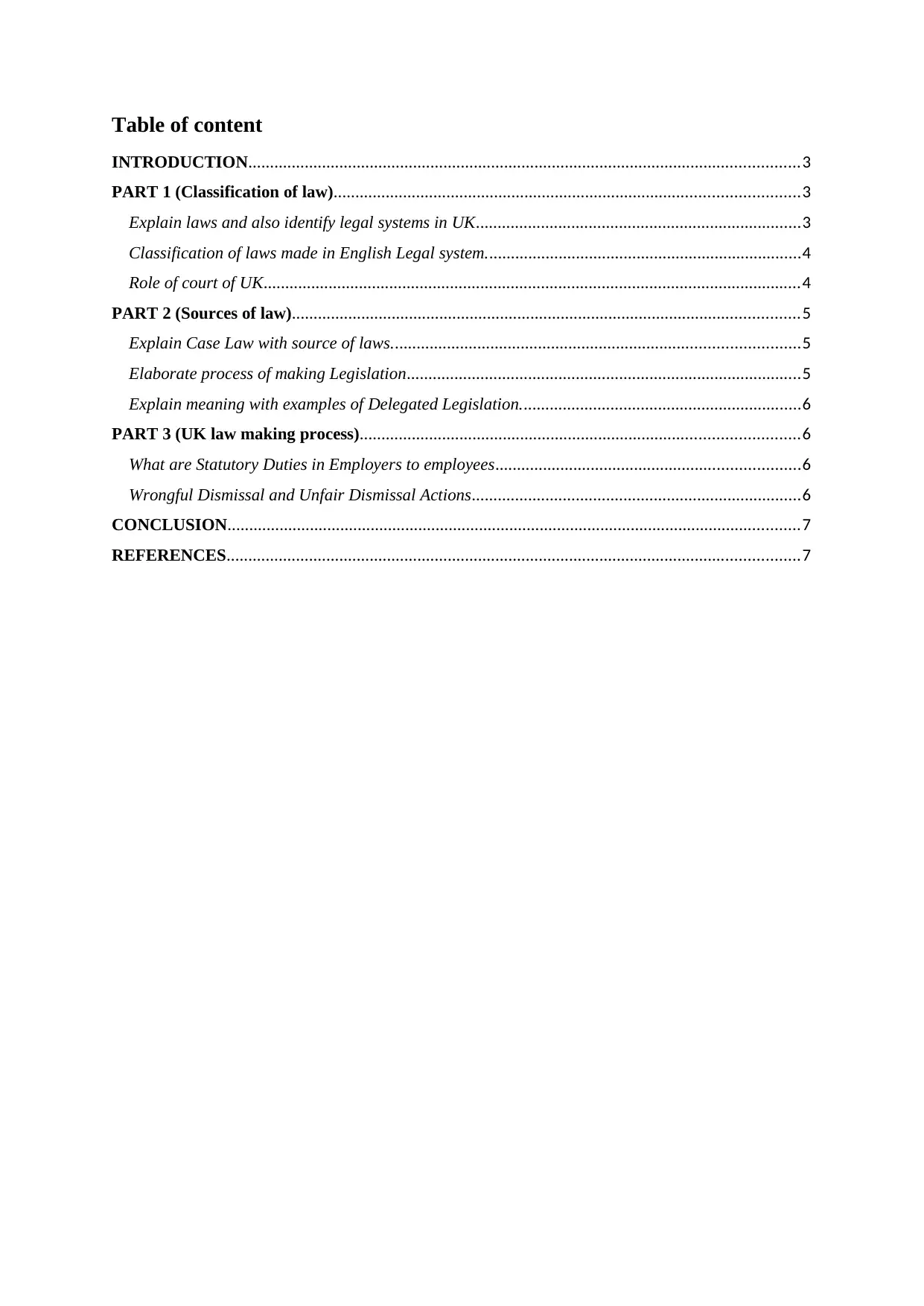
Table of content
INTRODUCTION...............................................................................................................................3
PART 1 (Classification of law)...........................................................................................................3
Explain laws and also identify legal systems in UK...........................................................................3
Classification of laws made in English Legal system.........................................................................4
Role of court of UK............................................................................................................................4
PART 2 (Sources of law).....................................................................................................................5
Explain Case Law with source of laws..............................................................................................5
Elaborate process of making Legislation...........................................................................................5
Explain meaning with examples of Delegated Legislation.................................................................6
PART 3 (UK law making process).....................................................................................................6
What are Statutory Duties in Employers to employees......................................................................6
Wrongful Dismissal and Unfair Dismissal Actions............................................................................6
CONCLUSION....................................................................................................................................7
REFERENCES....................................................................................................................................7
INTRODUCTION...............................................................................................................................3
PART 1 (Classification of law)...........................................................................................................3
Explain laws and also identify legal systems in UK...........................................................................3
Classification of laws made in English Legal system.........................................................................4
Role of court of UK............................................................................................................................4
PART 2 (Sources of law).....................................................................................................................5
Explain Case Law with source of laws..............................................................................................5
Elaborate process of making Legislation...........................................................................................5
Explain meaning with examples of Delegated Legislation.................................................................6
PART 3 (UK law making process).....................................................................................................6
What are Statutory Duties in Employers to employees......................................................................6
Wrongful Dismissal and Unfair Dismissal Actions............................................................................6
CONCLUSION....................................................................................................................................7
REFERENCES....................................................................................................................................7
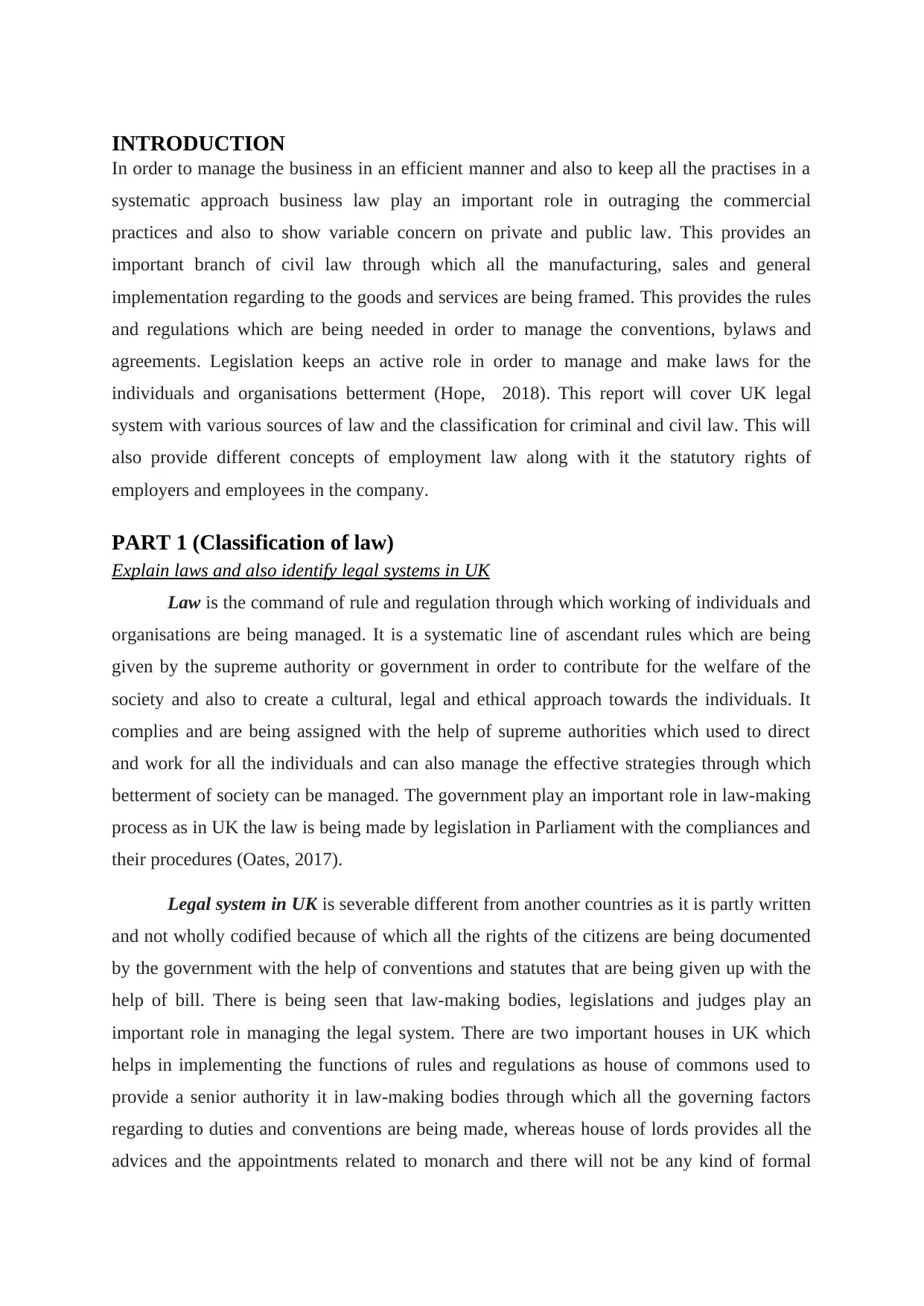
INTRODUCTION
In order to manage the business in an efficient manner and also to keep all the practises in a
systematic approach business law play an important role in outraging the commercial
practices and also to show variable concern on private and public law. This provides an
important branch of civil law through which all the manufacturing, sales and general
implementation regarding to the goods and services are being framed. This provides the rules
and regulations which are being needed in order to manage the conventions, bylaws and
agreements. Legislation keeps an active role in order to manage and make laws for the
individuals and organisations betterment (Hope, 2018). This report will cover UK legal
system with various sources of law and the classification for criminal and civil law. This will
also provide different concepts of employment law along with it the statutory rights of
employers and employees in the company.
PART 1 (Classification of law)
Explain laws and also identify legal systems in UK
Law is the command of rule and regulation through which working of individuals and
organisations are being managed. It is a systematic line of ascendant rules which are being
given by the supreme authority or government in order to contribute for the welfare of the
society and also to create a cultural, legal and ethical approach towards the individuals. It
complies and are being assigned with the help of supreme authorities which used to direct
and work for all the individuals and can also manage the effective strategies through which
betterment of society can be managed. The government play an important role in law-making
process as in UK the law is being made by legislation in Parliament with the compliances and
their procedures (Oates, 2017).
Legal system in UK is severable different from another countries as it is partly written
and not wholly codified because of which all the rights of the citizens are being documented
by the government with the help of conventions and statutes that are being given up with the
help of bill. There is being seen that law-making bodies, legislations and judges play an
important role in managing the legal system. There are two important houses in UK which
helps in implementing the functions of rules and regulations as house of commons used to
provide a senior authority it in law-making bodies through which all the governing factors
regarding to duties and conventions are being made, whereas house of lords provides all the
advices and the appointments related to monarch and there will not be any kind of formal
In order to manage the business in an efficient manner and also to keep all the practises in a
systematic approach business law play an important role in outraging the commercial
practices and also to show variable concern on private and public law. This provides an
important branch of civil law through which all the manufacturing, sales and general
implementation regarding to the goods and services are being framed. This provides the rules
and regulations which are being needed in order to manage the conventions, bylaws and
agreements. Legislation keeps an active role in order to manage and make laws for the
individuals and organisations betterment (Hope, 2018). This report will cover UK legal
system with various sources of law and the classification for criminal and civil law. This will
also provide different concepts of employment law along with it the statutory rights of
employers and employees in the company.
PART 1 (Classification of law)
Explain laws and also identify legal systems in UK
Law is the command of rule and regulation through which working of individuals and
organisations are being managed. It is a systematic line of ascendant rules which are being
given by the supreme authority or government in order to contribute for the welfare of the
society and also to create a cultural, legal and ethical approach towards the individuals. It
complies and are being assigned with the help of supreme authorities which used to direct
and work for all the individuals and can also manage the effective strategies through which
betterment of society can be managed. The government play an important role in law-making
process as in UK the law is being made by legislation in Parliament with the compliances and
their procedures (Oates, 2017).
Legal system in UK is severable different from another countries as it is partly written
and not wholly codified because of which all the rights of the citizens are being documented
by the government with the help of conventions and statutes that are being given up with the
help of bill. There is being seen that law-making bodies, legislations and judges play an
important role in managing the legal system. There are two important houses in UK which
helps in implementing the functions of rules and regulations as house of commons used to
provide a senior authority it in law-making bodies through which all the governing factors
regarding to duties and conventions are being made, whereas house of lords provides all the
advices and the appointments related to monarch and there will not be any kind of formal
⊘ This is a preview!⊘
Do you want full access?
Subscribe today to unlock all pages.

Trusted by 1+ million students worldwide
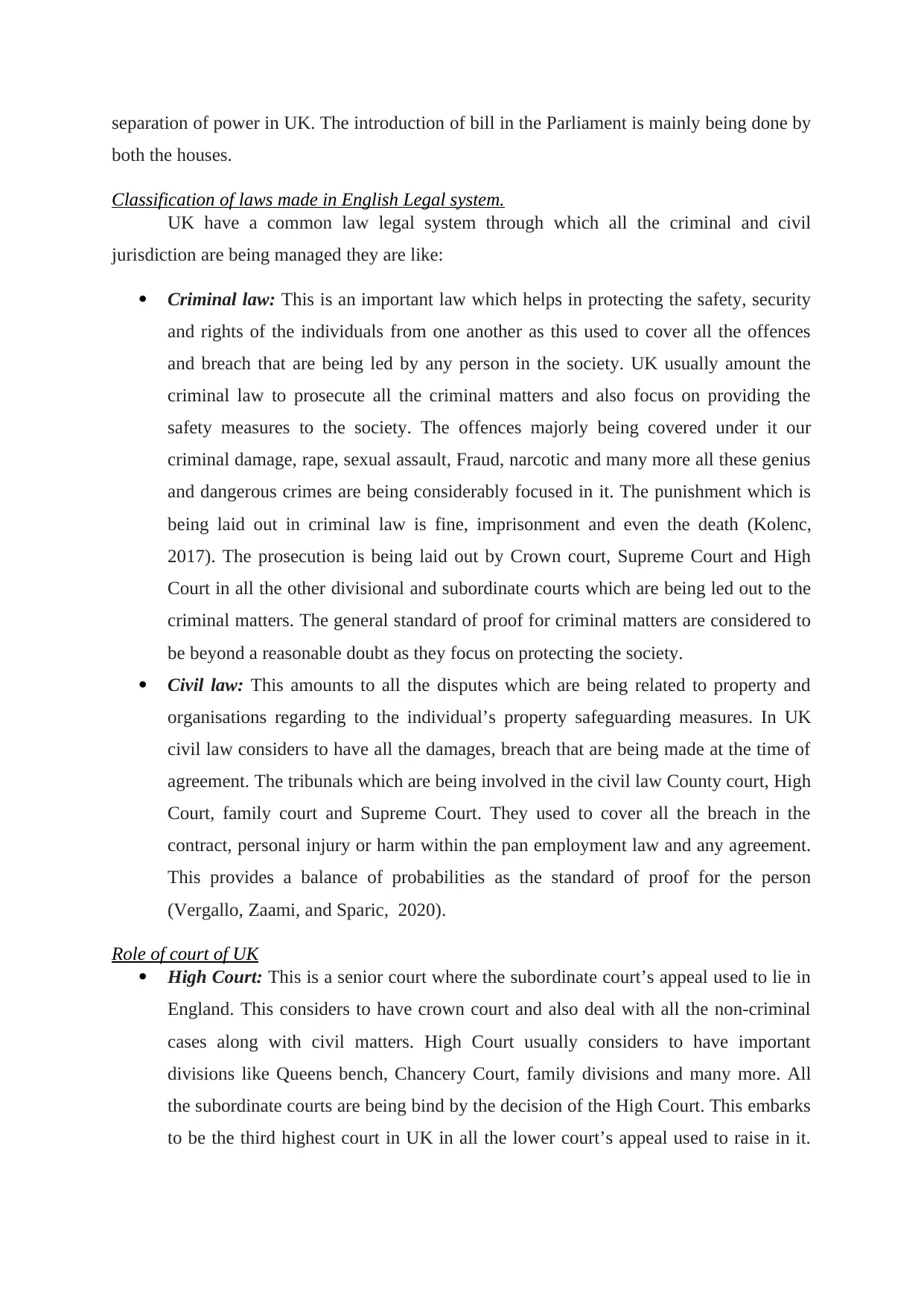
separation of power in UK. The introduction of bill in the Parliament is mainly being done by
both the houses.
Classification of laws made in English Legal system.
UK have a common law legal system through which all the criminal and civil
jurisdiction are being managed they are like:
Criminal law: This is an important law which helps in protecting the safety, security
and rights of the individuals from one another as this used to cover all the offences
and breach that are being led by any person in the society. UK usually amount the
criminal law to prosecute all the criminal matters and also focus on providing the
safety measures to the society. The offences majorly being covered under it our
criminal damage, rape, sexual assault, Fraud, narcotic and many more all these genius
and dangerous crimes are being considerably focused in it. The punishment which is
being laid out in criminal law is fine, imprisonment and even the death (Kolenc,
2017). The prosecution is being laid out by Crown court, Supreme Court and High
Court in all the other divisional and subordinate courts which are being led out to the
criminal matters. The general standard of proof for criminal matters are considered to
be beyond a reasonable doubt as they focus on protecting the society.
Civil law: This amounts to all the disputes which are being related to property and
organisations regarding to the individual’s property safeguarding measures. In UK
civil law considers to have all the damages, breach that are being made at the time of
agreement. The tribunals which are being involved in the civil law County court, High
Court, family court and Supreme Court. They used to cover all the breach in the
contract, personal injury or harm within the pan employment law and any agreement.
This provides a balance of probabilities as the standard of proof for the person
(Vergallo, Zaami, and Sparic, 2020).
Role of court of UK
High Court: This is a senior court where the subordinate court’s appeal used to lie in
England. This considers to have crown court and also deal with all the non-criminal
cases along with civil matters. High Court usually considers to have important
divisions like Queens bench, Chancery Court, family divisions and many more. All
the subordinate courts are being bind by the decision of the High Court. This embarks
to be the third highest court in UK in all the lower court’s appeal used to raise in it.
both the houses.
Classification of laws made in English Legal system.
UK have a common law legal system through which all the criminal and civil
jurisdiction are being managed they are like:
Criminal law: This is an important law which helps in protecting the safety, security
and rights of the individuals from one another as this used to cover all the offences
and breach that are being led by any person in the society. UK usually amount the
criminal law to prosecute all the criminal matters and also focus on providing the
safety measures to the society. The offences majorly being covered under it our
criminal damage, rape, sexual assault, Fraud, narcotic and many more all these genius
and dangerous crimes are being considerably focused in it. The punishment which is
being laid out in criminal law is fine, imprisonment and even the death (Kolenc,
2017). The prosecution is being laid out by Crown court, Supreme Court and High
Court in all the other divisional and subordinate courts which are being led out to the
criminal matters. The general standard of proof for criminal matters are considered to
be beyond a reasonable doubt as they focus on protecting the society.
Civil law: This amounts to all the disputes which are being related to property and
organisations regarding to the individual’s property safeguarding measures. In UK
civil law considers to have all the damages, breach that are being made at the time of
agreement. The tribunals which are being involved in the civil law County court, High
Court, family court and Supreme Court. They used to cover all the breach in the
contract, personal injury or harm within the pan employment law and any agreement.
This provides a balance of probabilities as the standard of proof for the person
(Vergallo, Zaami, and Sparic, 2020).
Role of court of UK
High Court: This is a senior court where the subordinate court’s appeal used to lie in
England. This considers to have crown court and also deal with all the non-criminal
cases along with civil matters. High Court usually considers to have important
divisions like Queens bench, Chancery Court, family divisions and many more. All
the subordinate courts are being bind by the decision of the High Court. This embarks
to be the third highest court in UK in all the lower court’s appeal used to raise in it.
Paraphrase This Document
Need a fresh take? Get an instant paraphrase of this document with our AI Paraphraser
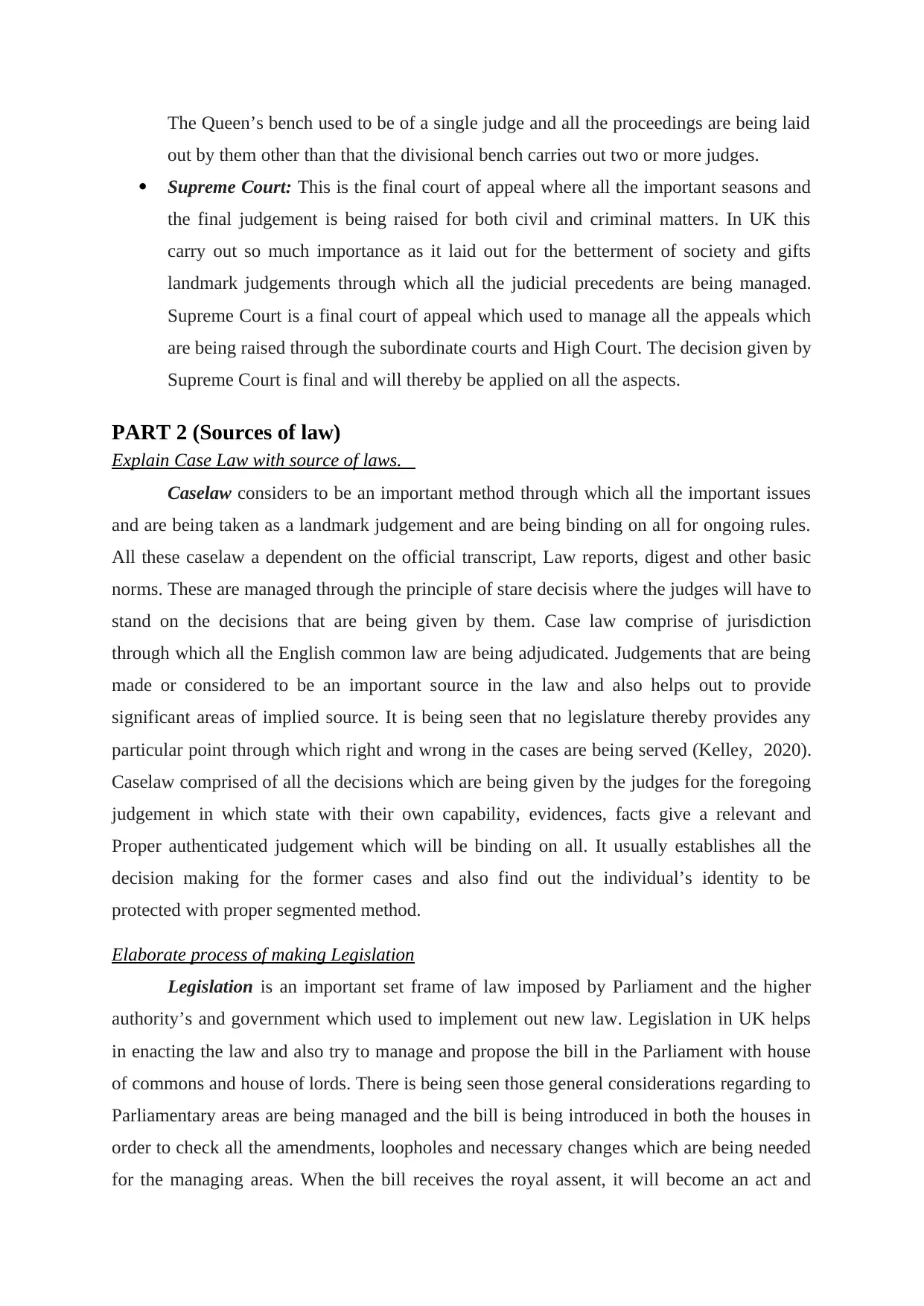
The Queen’s bench used to be of a single judge and all the proceedings are being laid
out by them other than that the divisional bench carries out two or more judges.
Supreme Court: This is the final court of appeal where all the important seasons and
the final judgement is being raised for both civil and criminal matters. In UK this
carry out so much importance as it laid out for the betterment of society and gifts
landmark judgements through which all the judicial precedents are being managed.
Supreme Court is a final court of appeal which used to manage all the appeals which
are being raised through the subordinate courts and High Court. The decision given by
Supreme Court is final and will thereby be applied on all the aspects.
PART 2 (Sources of law)
Explain Case Law with source of laws.
Caselaw considers to be an important method through which all the important issues
and are being taken as a landmark judgement and are being binding on all for ongoing rules.
All these caselaw a dependent on the official transcript, Law reports, digest and other basic
norms. These are managed through the principle of stare decisis where the judges will have to
stand on the decisions that are being given by them. Case law comprise of jurisdiction
through which all the English common law are being adjudicated. Judgements that are being
made or considered to be an important source in the law and also helps out to provide
significant areas of implied source. It is being seen that no legislature thereby provides any
particular point through which right and wrong in the cases are being served (Kelley, 2020).
Caselaw comprised of all the decisions which are being given by the judges for the foregoing
judgement in which state with their own capability, evidences, facts give a relevant and
Proper authenticated judgement which will be binding on all. It usually establishes all the
decision making for the former cases and also find out the individual’s identity to be
protected with proper segmented method.
Elaborate process of making Legislation
Legislation is an important set frame of law imposed by Parliament and the higher
authority’s and government which used to implement out new law. Legislation in UK helps
in enacting the law and also try to manage and propose the bill in the Parliament with house
of commons and house of lords. There is being seen those general considerations regarding to
Parliamentary areas are being managed and the bill is being introduced in both the houses in
order to check all the amendments, loopholes and necessary changes which are being needed
for the managing areas. When the bill receives the royal assent, it will become an act and
out by them other than that the divisional bench carries out two or more judges.
Supreme Court: This is the final court of appeal where all the important seasons and
the final judgement is being raised for both civil and criminal matters. In UK this
carry out so much importance as it laid out for the betterment of society and gifts
landmark judgements through which all the judicial precedents are being managed.
Supreme Court is a final court of appeal which used to manage all the appeals which
are being raised through the subordinate courts and High Court. The decision given by
Supreme Court is final and will thereby be applied on all the aspects.
PART 2 (Sources of law)
Explain Case Law with source of laws.
Caselaw considers to be an important method through which all the important issues
and are being taken as a landmark judgement and are being binding on all for ongoing rules.
All these caselaw a dependent on the official transcript, Law reports, digest and other basic
norms. These are managed through the principle of stare decisis where the judges will have to
stand on the decisions that are being given by them. Case law comprise of jurisdiction
through which all the English common law are being adjudicated. Judgements that are being
made or considered to be an important source in the law and also helps out to provide
significant areas of implied source. It is being seen that no legislature thereby provides any
particular point through which right and wrong in the cases are being served (Kelley, 2020).
Caselaw comprised of all the decisions which are being given by the judges for the foregoing
judgement in which state with their own capability, evidences, facts give a relevant and
Proper authenticated judgement which will be binding on all. It usually establishes all the
decision making for the former cases and also find out the individual’s identity to be
protected with proper segmented method.
Elaborate process of making Legislation
Legislation is an important set frame of law imposed by Parliament and the higher
authority’s and government which used to implement out new law. Legislation in UK helps
in enacting the law and also try to manage and propose the bill in the Parliament with house
of commons and house of lords. There is being seen those general considerations regarding to
Parliamentary areas are being managed and the bill is being introduced in both the houses in
order to check all the amendments, loopholes and necessary changes which are being needed
for the managing areas. When the bill receives the royal assent, it will become an act and
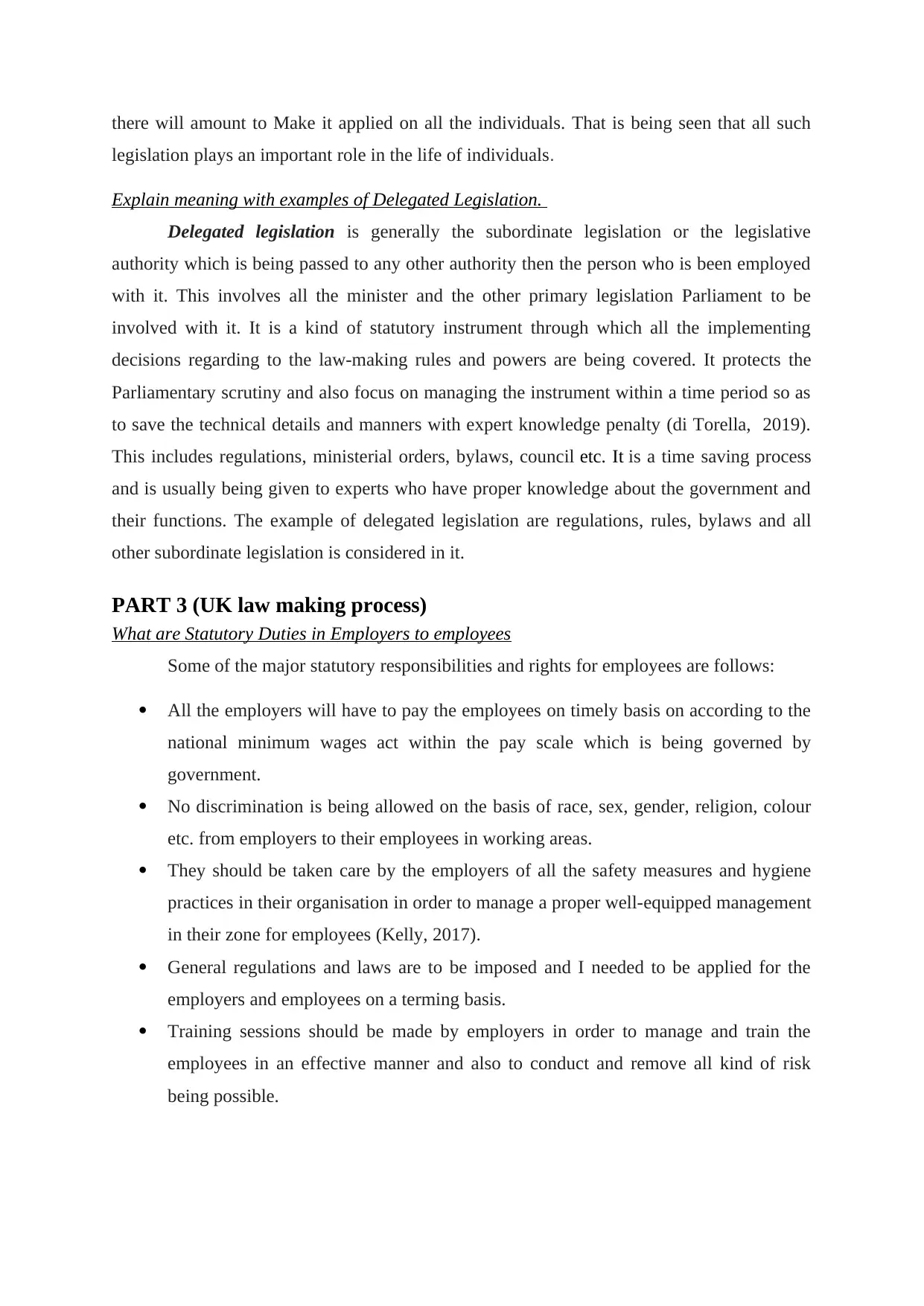
there will amount to Make it applied on all the individuals. That is being seen that all such
legislation plays an important role in the life of individuals.
Explain meaning with examples of Delegated Legislation.
Delegated legislation is generally the subordinate legislation or the legislative
authority which is being passed to any other authority then the person who is been employed
with it. This involves all the minister and the other primary legislation Parliament to be
involved with it. It is a kind of statutory instrument through which all the implementing
decisions regarding to the law-making rules and powers are being covered. It protects the
Parliamentary scrutiny and also focus on managing the instrument within a time period so as
to save the technical details and manners with expert knowledge penalty (di Torella, 2019).
This includes regulations, ministerial orders, bylaws, council etc. It is a time saving process
and is usually being given to experts who have proper knowledge about the government and
their functions. The example of delegated legislation are regulations, rules, bylaws and all
other subordinate legislation is considered in it.
PART 3 (UK law making process)
What are Statutory Duties in Employers to employees
Some of the major statutory responsibilities and rights for employees are follows:
All the employers will have to pay the employees on timely basis on according to the
national minimum wages act within the pay scale which is being governed by
government.
No discrimination is being allowed on the basis of race, sex, gender, religion, colour
etc. from employers to their employees in working areas.
They should be taken care by the employers of all the safety measures and hygiene
practices in their organisation in order to manage a proper well-equipped management
in their zone for employees (Kelly, 2017).
General regulations and laws are to be imposed and I needed to be applied for the
employers and employees on a terming basis.
Training sessions should be made by employers in order to manage and train the
employees in an effective manner and also to conduct and remove all kind of risk
being possible.
legislation plays an important role in the life of individuals.
Explain meaning with examples of Delegated Legislation.
Delegated legislation is generally the subordinate legislation or the legislative
authority which is being passed to any other authority then the person who is been employed
with it. This involves all the minister and the other primary legislation Parliament to be
involved with it. It is a kind of statutory instrument through which all the implementing
decisions regarding to the law-making rules and powers are being covered. It protects the
Parliamentary scrutiny and also focus on managing the instrument within a time period so as
to save the technical details and manners with expert knowledge penalty (di Torella, 2019).
This includes regulations, ministerial orders, bylaws, council etc. It is a time saving process
and is usually being given to experts who have proper knowledge about the government and
their functions. The example of delegated legislation are regulations, rules, bylaws and all
other subordinate legislation is considered in it.
PART 3 (UK law making process)
What are Statutory Duties in Employers to employees
Some of the major statutory responsibilities and rights for employees are follows:
All the employers will have to pay the employees on timely basis on according to the
national minimum wages act within the pay scale which is being governed by
government.
No discrimination is being allowed on the basis of race, sex, gender, religion, colour
etc. from employers to their employees in working areas.
They should be taken care by the employers of all the safety measures and hygiene
practices in their organisation in order to manage a proper well-equipped management
in their zone for employees (Kelly, 2017).
General regulations and laws are to be imposed and I needed to be applied for the
employers and employees on a terming basis.
Training sessions should be made by employers in order to manage and train the
employees in an effective manner and also to conduct and remove all kind of risk
being possible.
⊘ This is a preview!⊘
Do you want full access?
Subscribe today to unlock all pages.

Trusted by 1+ million students worldwide
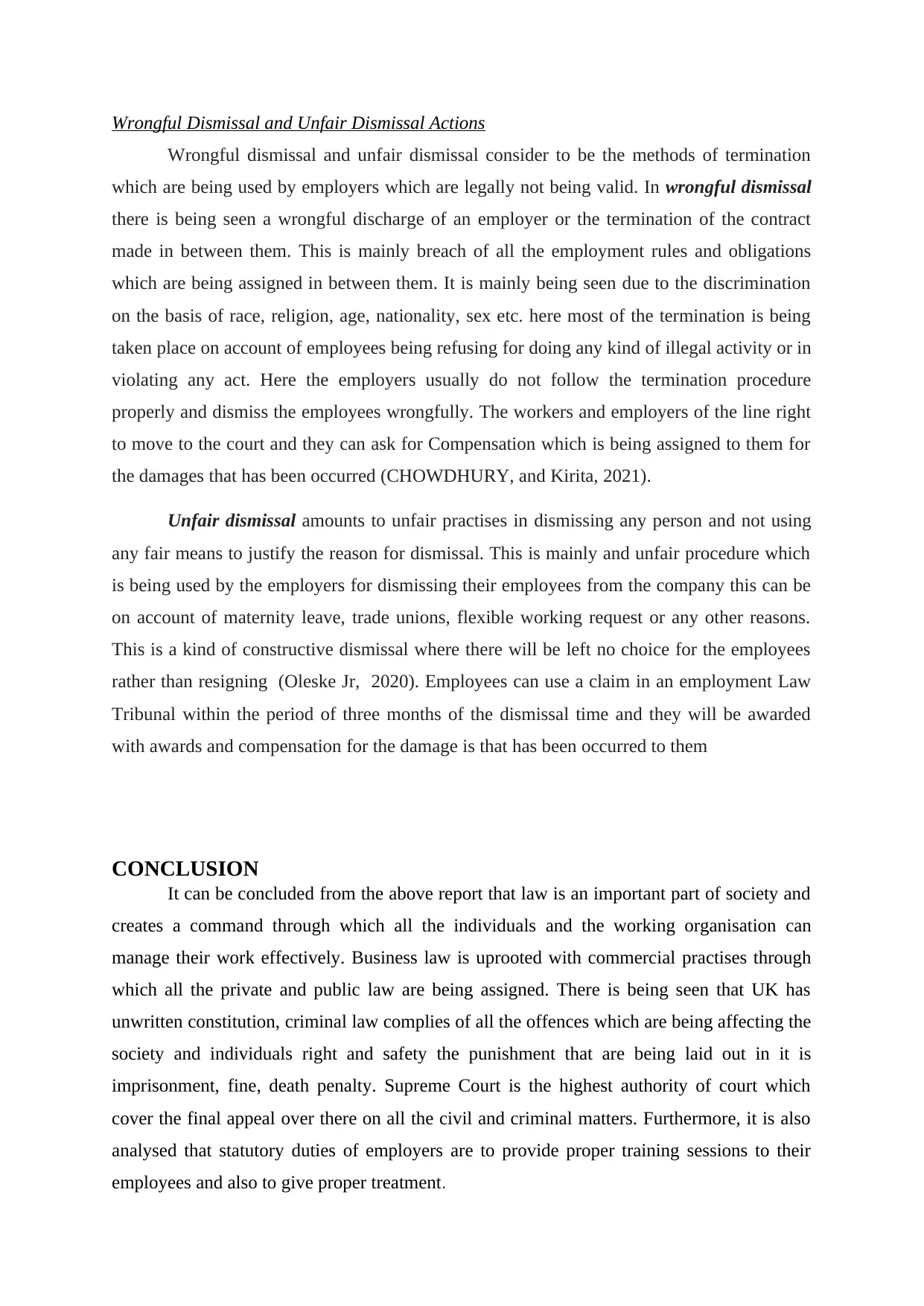
Wrongful Dismissal and Unfair Dismissal Actions
Wrongful dismissal and unfair dismissal consider to be the methods of termination
which are being used by employers which are legally not being valid. In wrongful dismissal
there is being seen a wrongful discharge of an employer or the termination of the contract
made in between them. This is mainly breach of all the employment rules and obligations
which are being assigned in between them. It is mainly being seen due to the discrimination
on the basis of race, religion, age, nationality, sex etc. here most of the termination is being
taken place on account of employees being refusing for doing any kind of illegal activity or in
violating any act. Here the employers usually do not follow the termination procedure
properly and dismiss the employees wrongfully. The workers and employers of the line right
to move to the court and they can ask for Compensation which is being assigned to them for
the damages that has been occurred (CHOWDHURY, and Kirita, 2021).
Unfair dismissal amounts to unfair practises in dismissing any person and not using
any fair means to justify the reason for dismissal. This is mainly and unfair procedure which
is being used by the employers for dismissing their employees from the company this can be
on account of maternity leave, trade unions, flexible working request or any other reasons.
This is a kind of constructive dismissal where there will be left no choice for the employees
rather than resigning (Oleske Jr, 2020). Employees can use a claim in an employment Law
Tribunal within the period of three months of the dismissal time and they will be awarded
with awards and compensation for the damage is that has been occurred to them
CONCLUSION
It can be concluded from the above report that law is an important part of society and
creates a command through which all the individuals and the working organisation can
manage their work effectively. Business law is uprooted with commercial practises through
which all the private and public law are being assigned. There is being seen that UK has
unwritten constitution, criminal law complies of all the offences which are being affecting the
society and individuals right and safety the punishment that are being laid out in it is
imprisonment, fine, death penalty. Supreme Court is the highest authority of court which
cover the final appeal over there on all the civil and criminal matters. Furthermore, it is also
analysed that statutory duties of employers are to provide proper training sessions to their
employees and also to give proper treatment.
Wrongful dismissal and unfair dismissal consider to be the methods of termination
which are being used by employers which are legally not being valid. In wrongful dismissal
there is being seen a wrongful discharge of an employer or the termination of the contract
made in between them. This is mainly breach of all the employment rules and obligations
which are being assigned in between them. It is mainly being seen due to the discrimination
on the basis of race, religion, age, nationality, sex etc. here most of the termination is being
taken place on account of employees being refusing for doing any kind of illegal activity or in
violating any act. Here the employers usually do not follow the termination procedure
properly and dismiss the employees wrongfully. The workers and employers of the line right
to move to the court and they can ask for Compensation which is being assigned to them for
the damages that has been occurred (CHOWDHURY, and Kirita, 2021).
Unfair dismissal amounts to unfair practises in dismissing any person and not using
any fair means to justify the reason for dismissal. This is mainly and unfair procedure which
is being used by the employers for dismissing their employees from the company this can be
on account of maternity leave, trade unions, flexible working request or any other reasons.
This is a kind of constructive dismissal where there will be left no choice for the employees
rather than resigning (Oleske Jr, 2020). Employees can use a claim in an employment Law
Tribunal within the period of three months of the dismissal time and they will be awarded
with awards and compensation for the damage is that has been occurred to them
CONCLUSION
It can be concluded from the above report that law is an important part of society and
creates a command through which all the individuals and the working organisation can
manage their work effectively. Business law is uprooted with commercial practises through
which all the private and public law are being assigned. There is being seen that UK has
unwritten constitution, criminal law complies of all the offences which are being affecting the
society and individuals right and safety the punishment that are being laid out in it is
imprisonment, fine, death penalty. Supreme Court is the highest authority of court which
cover the final appeal over there on all the civil and criminal matters. Furthermore, it is also
analysed that statutory duties of employers are to provide proper training sessions to their
employees and also to give proper treatment.
Paraphrase This Document
Need a fresh take? Get an instant paraphrase of this document with our AI Paraphraser
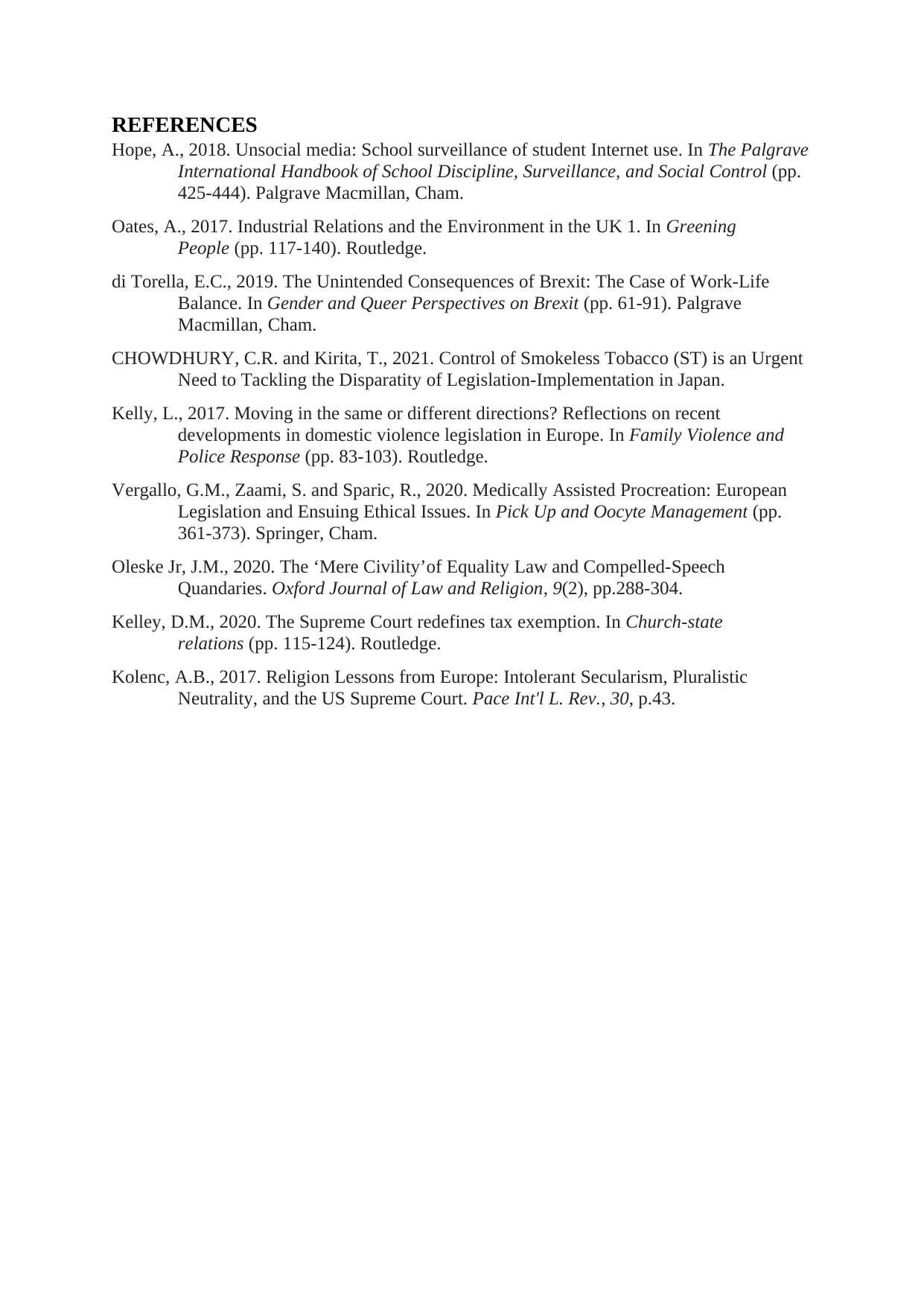
REFERENCES
Hope, A., 2018. Unsocial media: School surveillance of student Internet use. In The Palgrave
International Handbook of School Discipline, Surveillance, and Social Control (pp.
425-444). Palgrave Macmillan, Cham.
Oates, A., 2017. Industrial Relations and the Environment in the UK 1. In Greening
People (pp. 117-140). Routledge.
di Torella, E.C., 2019. The Unintended Consequences of Brexit: The Case of Work-Life
Balance. In Gender and Queer Perspectives on Brexit (pp. 61-91). Palgrave
Macmillan, Cham.
CHOWDHURY, C.R. and Kirita, T., 2021. Control of Smokeless Tobacco (ST) is an Urgent
Need to Tackling the Disparatity of Legislation-Implementation in Japan.
Kelly, L., 2017. Moving in the same or different directions? Reflections on recent
developments in domestic violence legislation in Europe. In Family Violence and
Police Response (pp. 83-103). Routledge.
Vergallo, G.M., Zaami, S. and Sparic, R., 2020. Medically Assisted Procreation: European
Legislation and Ensuing Ethical Issues. In Pick Up and Oocyte Management (pp.
361-373). Springer, Cham.
Oleske Jr, J.M., 2020. The ‘Mere Civility’of Equality Law and Compelled-Speech
Quandaries. Oxford Journal of Law and Religion, 9(2), pp.288-304.
Kelley, D.M., 2020. The Supreme Court redefines tax exemption. In Church-state
relations (pp. 115-124). Routledge.
Kolenc, A.B., 2017. Religion Lessons from Europe: Intolerant Secularism, Pluralistic
Neutrality, and the US Supreme Court. Pace Int'l L. Rev., 30, p.43.
Hope, A., 2018. Unsocial media: School surveillance of student Internet use. In The Palgrave
International Handbook of School Discipline, Surveillance, and Social Control (pp.
425-444). Palgrave Macmillan, Cham.
Oates, A., 2017. Industrial Relations and the Environment in the UK 1. In Greening
People (pp. 117-140). Routledge.
di Torella, E.C., 2019. The Unintended Consequences of Brexit: The Case of Work-Life
Balance. In Gender and Queer Perspectives on Brexit (pp. 61-91). Palgrave
Macmillan, Cham.
CHOWDHURY, C.R. and Kirita, T., 2021. Control of Smokeless Tobacco (ST) is an Urgent
Need to Tackling the Disparatity of Legislation-Implementation in Japan.
Kelly, L., 2017. Moving in the same or different directions? Reflections on recent
developments in domestic violence legislation in Europe. In Family Violence and
Police Response (pp. 83-103). Routledge.
Vergallo, G.M., Zaami, S. and Sparic, R., 2020. Medically Assisted Procreation: European
Legislation and Ensuing Ethical Issues. In Pick Up and Oocyte Management (pp.
361-373). Springer, Cham.
Oleske Jr, J.M., 2020. The ‘Mere Civility’of Equality Law and Compelled-Speech
Quandaries. Oxford Journal of Law and Religion, 9(2), pp.288-304.
Kelley, D.M., 2020. The Supreme Court redefines tax exemption. In Church-state
relations (pp. 115-124). Routledge.
Kolenc, A.B., 2017. Religion Lessons from Europe: Intolerant Secularism, Pluralistic
Neutrality, and the US Supreme Court. Pace Int'l L. Rev., 30, p.43.
1 out of 8
Related Documents
Your All-in-One AI-Powered Toolkit for Academic Success.
+13062052269
info@desklib.com
Available 24*7 on WhatsApp / Email
![[object Object]](/_next/static/media/star-bottom.7253800d.svg)
Unlock your academic potential
Copyright © 2020–2026 A2Z Services. All Rights Reserved. Developed and managed by ZUCOL.


